PARIS — Frances Emmanuel Macron knows his country is not about to develop a local equivalent of Google or Facebook to power the development of artificial intelligence.
But in a national AI strategy to be unveiled this week, the French president will argue that France has other assets to fuel innovation: its foreign brain trust, huge troves of state-owned data and links to European research institutes to share and leverage knowledge, according to French officials.
Macrons aim is nothing less than to drag his country into the age of AI and erase 30 years of underperformance on innovation.
“We missed all the big technological revolutions of recent years, but France has a card to play in the field of artificial intelligence,” said an aide to the president who asked not to be named. “Either we seize the chance now, or we watch another wave pass us by.”
In a briefing with journalists ahead of the strategys unveiling Thursday, two advisers to Macron conceded that France was starting from way behind China and the United States on AI, and their fiscal-deficit-challenged state would not be able to tap billions of euros in taxpayer money. Venture capital remains far more limited in France than in the U.S., and there are no plans to overhaul tax rules to draw in investors.
Another key aspect of Macrons plan is to lure French AI researchers, many of whom occupy top positions in Silicon Valley, back to France.
Yet aides argued that Paris, which has just brought its budget deficit under a European Union threshold, would still muster a “considerable” financial effort. The total earmarked for AI research in Frances next budget would exceed, for example, the amount that Finland is investing, they said, without specifying a figure. Finland plans to spend about €200 million over the next four years.
Macrons idea, the aides said, was to leverage the cash to develop sector-specific AI technology in areas where France has an edge thanks to its giant, state-run agencies and vast troves of centrally collected public and private data.
Medical records amassed by Frances state-run hospitals, for example, are a data goldmine that was already fueling AI-powered tumor-detection technology, an aide said.
“Paradoxically, the fact of having a big centralized state and vast public records is an advantage in this area, because you can organize the data as you see fit,” said the same aide, adding that France may launch a central data agency to oversee control of such information.
Another key aspect of Macrons plan is to lure French researchers, many of whom occupy top positions in the AI departments of Silicon Valley firms, back to France. “The people in charge inside these firms are often French, trained at our universities in mathematics,” the other aide said. France would try to entice them with similar arguments as deployed for Macrons “Make Our Planet Great Again” strategy, which aimed to draw researchers on climate change, the aide said.
No Airbus for AI
Data, and plenty of it, is at the heart of Frances AI strategy. But Macron — who is due to unveil the plans after a star-studded dinner featuring top industry players in the field Thursday — will argue that France and Europe more broadly need to keep concerns about privacy at the heart of their approach to AI.
Following a transatlantic scandal over allegations that some 50 million Facebook users had their personal data improperly collected, the French officials said that mass collection of personal data for marketing or political purposes was out of the question (France already outlaws political advertising of the type thats at the center of the Facebook-Cambridge Analytica scandal).
All data collection for AI research would have to be done in conformity with the EUs sweeping new privacy rules due to be unveiled at the end of May, the General Data Protection Regulation, aides said.
“GDPR can be a competitive advantage for us, in fact,” one aide said.
Not everything about Macrons plan would be brand new. Some of its funds would be drawn from a €300 million fund for radical innovation announced last year by Finance Minister Bruno Le Maire. Financing would also come from the European Union, as the Commission plans to mobilize some €200 million per year until 2020 for AI research as part of its own strategy.

Macron is due to unveil the plans after a star-studded dinner | Ludovic Marin/AFP via Getty Images
France would also work closely with Germany, following the establishment of the JEDI collective, a research institute devoted to technological innovation.
In the end, the idea was not to recreate state-funded giants like Airbus, the aides said, but to foster innovation by funding research and helping products get developed from the ground up.
“I think applying the Airbus model to artificial intelligence is an anachronism,” an aide said.
Correction: Finland plans to spend about €200 million over the next four years. An earlier version of this article misattributed that figure.
The article has been updated to clarify that the strategy will be unveiled Thursday.
[contf] [contfnew]























































